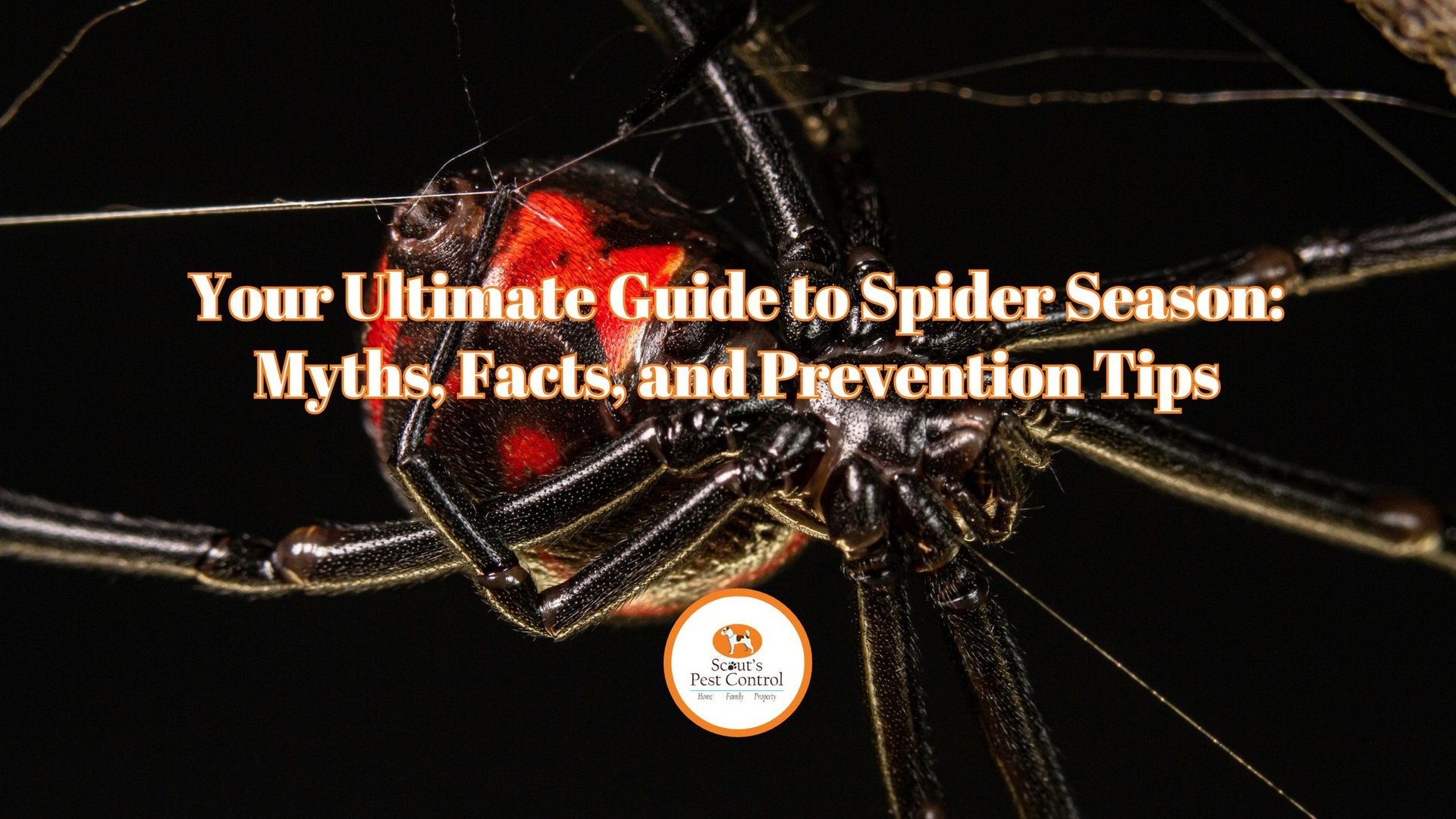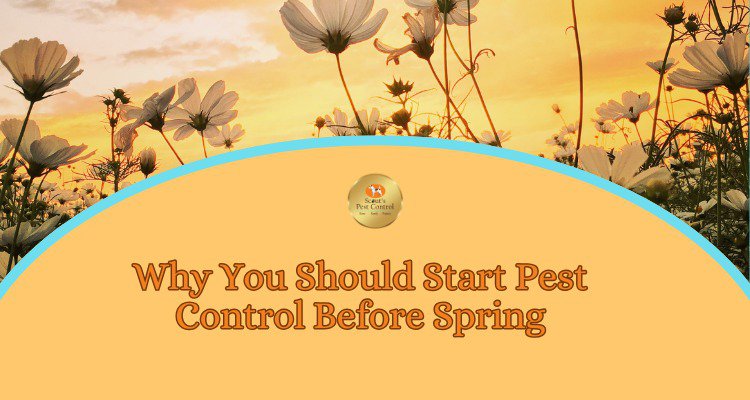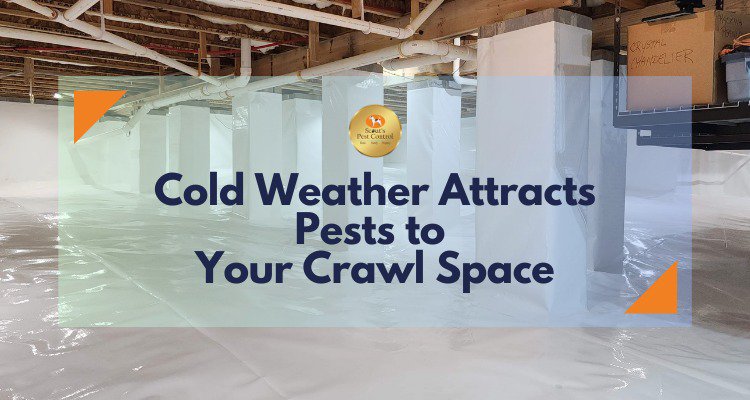Myths, Facts, and Prevention Tips
Whilst spiders are fascinating, the very thought of dealing with them as a homeowner strikes fear into the hearts of many people. Spider season is here in South Carolina, and. as the leaves change and the air turns crisp, homeowners get concerned with the increase in spiders around the home.
But why do we see more of them around? Furthermore, if you are a lover of the outdoors and enjoy hiking, you will often run through webs or feel that sense of touch on your head as you meander through the forest. We become acutely aware of spiders at this time. However, this heightened awareness often spirals into a deeper fear, leading to myths and misconceptions about these eight-legged creatures. Understanding the facts surrounding spider season can help demystify their presence and ease anxieties.
In regions like South Carolina, various spider species become more visible during the fall, drawing attention to their unique behaviors and ecological benefits. While most spiders play a crucial role in the ecosystem by controlling pest populations, it is essential to recognize which species may pose risks and when they are most active, and what you can do about it.
Let’s navigate through the complexities of spider season, from understanding mating habits of spiders to essential prevention tips for homeowners, and of course business owners too. You can take action to protect yourself from spiders invading your home and this guide will help you.
Fear Of Spiders
The fear of spiders, known as arachnophobia. It is a common phobia that affects people worldwide. This fear can range from mild discomfort to a debilitating terror that can dramatically impact daily life. Several factors contribute to why spiders invoke fear:
Appearance: Spiders have multiple legs and sometimes seem to move unpredictably, which can trigger an unease or fear response in some individuals.

Association with danger: Although most spiders in South Carolina and beyond are harmless, a few, like the black widows and brown recluse spiders, can deliver venomous bites when threatened. However, you must remember, all spiders can bite but not all can penetrate the human skin and they really do not want to bite you unless threatened. More about that later.
Cultural influences: Spiders often have a negative portrayal in media and folklore, exacerbating the fear.
For those with severe arachnophobia, encountering spiders or even spider webs can lead to a range of symptoms, including panic attacks, rapid heartbeat, and intense anxiety. These fears can be so profound that individuals may go to extreme lengths to avoid areas where spiders might be present, such as basements and garages, or even outdoor activities during spider season, which typically peaks in late summer.
Effective pest control measures like sealing window sills, installing proper window screens, and regular removal of spider webs can help mitigate the presence of spiders, potentially reducing the fear in affected individuals.
Spider Species In South Carolina
In South Carolina, we have a few different species and we have not listed all of them here. As a home owner, you should be aware of the ones that are more notable. Among the most widely feared in the area is the venomous black widow spider, typically found in secluded areas like garden sheds and wood piles. Caution is advised around these arachnids known for their distinctive red hourglass marking. As mentioned before, a spider will not bite unless disturbed and they feel threatened.

Another species demanding respect due to its venomous bite is the brown recluse spider. Whilst there are few sightings or bite cases in the area, it does not mean that are not here and should be taken into consideration. They are recognizable by the violin-shaped marking on its back, the brown recluse prefers undisturbed areas and can become defensive if threatened. Thier bite is necrtizing, which means the poison will rot away flesh. Whilst this sounds horrible, it is their way of digesting food and is natural to this species.
Other Spider Species
Other Spiders that are a significant part of South Carolina's ecosystem, include common species such as the imposing wolf spider, distinguished by its size and speed. While not lethal, its appearance can be startling. Other spiders, like the southeastern wandering spider, multiple jumping spider types, and the southern house spider, play essential roles in managing insect populations. They may be intimidating, but they play a crucial role in pest control.
Furthermore, spiders like the black house spider and the huntsman spider add to the state's spider diversity. But perhaps one of the most feared and less known, but totally harmless is the Joro spider. This is an invasive specied which has garnered attention for its vivid coloring and its massive golden webs that can span 10 feet or more.
By understanding these species, residents can appreciate their roles in pest control and take appropriate measures to coexist safely with these eight-legged neighbors.
Benefits Of Spiders
Spiders are often undervalued members of our ecosystem, especially when it comes to their roles inside our homes. These eight-legged creatures serve as significant pest control agents, helping to keep various insect pest populations in check. This is highly beneficial not only for our gardens and crops but also for our living spaces.

House spiders are quite the skilled hunters, naturally preying on household pests that we often find bothersome. Flies, fleas, bed bugs, carpet beetles, and clothes moths are just a few examples of the pests they help manage. In essence, spiders contribute to indoor pest control, offering their services free of charge.
Though it may be unsettling for some to learn, all spiders are equipped with venom. However, it's essential to understand that most spider species pose no real threat to humans, rendering them mostly harmless creatures.
Encouraging spiders to dwell in your home can be seen as enlisting free, diligent pest patrollers. As they rid your home of various annoying insects, they can inadvertently become seasonal decorators. Around Halloween, spider webs add a touch of authenticity to your spooky decor, exemplifying their dual role as both pest control agents and contributors to holiday ambiance.
An Overview of The Benefits of Spiders:
- Pest Control: Spiders consume many household pests, thereby controlling their population.
- Cost-Efficient: They provide natural pest management without the need for additional costs.
- Harmless: Most house spiders are not a threat to humans, making them safe to coexist with.
- Seasonal Decor: Spider webs can add a festive touch during Halloween season.
Spider Mating Season: An Overview
As the warm embrace of late summer gives way to the crispness of fall in regions like South Carolina, one might notice an uptick in spider activity. This seasonal phenomenon is not by chance; it's spider mating season. During this critical period, there's a surge in the visibility of large female spiders. These arachnids are on a mission to find mates and secure a future for their species.

The fall doesn't just signal a time for romance in the spider world but also marks a quest for survival. Spiders seek out safe havens to lay their precious egg sacs, ensuring their brood can withstand the oncoming winter chills. Interestingly, while some species opt for spring egg-laying, many coincide with the fall, preferring the warmth of sequestered spaces.
This time of the year also sees the maturation of spiderlings from eggs deposited in spring, adding to the apparent spider population. The increase in spider sightings is linked to their instinctual drive to find shelter before colder temperatures set in, with a noticeable spike in the weaving of webs across window sills and within the protection of window screens. As a result, residents might need to be more vigilant about pest control during this peak spider season.
Why You See More Spiders In Fall
As fall approaches and temperatures begin to dip, you may notice an uptick in spider activity within and around your home. This phenomenon, commonly referred to as spider season, is not due to a sudden population boom, but rather a visibility of spiders that hatched in spring and have now matured by late summer. These adult spiders are on the prowl for mates and a warm environment to lay their eggs before the chill of winter sets in.
Georgia, for example, is home to an array of spider species— approximately thirty-eight, in fact. Among them is the notorious black widow, known for its potentially dangerous bite. While some spider species have lifespans as short as a year, others can live up to a quarter of a century, which explains why spider sightings seem perennial.
Homeowners should be aware that common areas such as window sills and screens become attractive spots for spiders to convene and weave their webs. Preventative measures like pest control can be considered to manage the presence of these eight-legged guests. Understanding that spiders are essential in controlling insect pests, observing spider season can be a fascinating and informative experience marking the change of seasons.
Dangerous Spiders You Need To Be Aware Of
In understanding the dangers posed by spiders, it's essential to be informed about which species can cause harm. In South Carolina, as in Georgia, residents should be aware of a few spiders that can pose serious risks to humans.
Dangerous Spiders in South Carolina:

Black Widow Spiders: Identifiable by a glossy black body with a distinctive reddish hourglass shape on the abdomen. Bites can lead to severe muscle pain and cramping.
Brown Recluse Spiders: Known for their flesh-destructive bites. While not usually fatal, their bites require immediate medical attention.

Other Noteworthy Spiders
- Wolf Spiders: Intimidating in appearance but their bites are generally not fatal.
- Black House Spiders: Can inflict a painful bite but are not generally lethal.
- Mouse and Hobo Spiders: In Georgia, these are considered dangerous but are typically not lethal.
Despite their fearsome reputation, the Giant House Spider, often encountered in homes, is actually non-threatening and non-venomous to humans.
It is important to check common areas where spiders may inhabit, such as window sills and screens, especially during the warmer months which escalate spider activity. In the case of a spider infestation, pest control is recommended to curb the population and minimize risk.
Always exercise caution and consider professional help when dealing with spiders known for harmful bites.
The Need For Regular Spider Control
As homeowners in South Carolina welcome the cooler weather, so do the spiders, seeking warmth and shelter indoors. This makes regular pest control a critical routine, especially during these months. Spiders like black widows, common house spiders, and brown recluse spiders, all prevalent in South Carolina, may use this time to find refuge in our homes.
Professional pest control is particularly important as many spider species reproduce rapidly. Female spiders, such as the orb weaver and wolf spiders, may lay thousands of eggs in early spring. Without timely intervention, this can lead to a significant increase in spider populations by the time spider season rolls around in late summer.
Spider Pest Control
Something to take note of; It is notoriously difficult to control spiders with normal pest treatments. The reality is that a combination of strategies are necessary. Spiders biology and physiology means that normal pest products are inneffective. According to Kenny;
Spiders are very difficult to control as they do not groom like other insects making it impossible for residual pesticide to work. That and they walk on there tip toes basically so almost no contact with treated surfaces. Kenny Sicillian
Therefore it is important to use a systematic approach to controlling spiders, and this is where we partner with you – the homeowner. We always remove spider webs around your property as part of our spider maintenance, but you will see their webs return. That’s just the behavior of spider’s. They will return and construct more webs. That’s why when we remove them, you are encouraged to partner with us and continue the same type of regular maintenance in brushing down areas such as decks and window sills.
It’s more about general pest control
It is imperative that maintaining cleanliness is vital; a tidy home and yard reduce the presence of insect pests, the primary food source for spiders. If you keep up with regular pest control, then it will reduce the food source for spiders and this is one of the best ways to keep the population down. If there are no potential food sources for the spiders, they will move else where to find those sources. Keep up regular pest control around and in your home.
Quick note!
If we need to take action due to a potential spider infestation, we can treat webs with other products such as non repellent dusts.
Preventative Measures Recap

- Regular pest control services
- Clean interiors and exteriors
- Seal cracks and gaps
- Proper window and door maintenance
Remember, an ounce of prevention with expert pest control services provides the peace of mind that your home remains free from unwanted eight-legged visitors year-round.
Holistic Tips For Homeowners During Spider Season
You can take a natural holistic approach to controlling spiders, but this is very limited in scope and should be used as an addition to your normal pest control problem. Consider leveraging natural repellents like citrus scents, as well as peppermint and eucalyptus essential oils. These can can deter spiders, and there are some reports of success with this. However, the jury is out on the real effectiveness of this approach alone. These simple and natural solutions can be a support to regular pest control.
Final Thoughts On Spider Season
In South Carolina, residents often observe an uptick in spider activity during spider season, which primarily peaks in the late summer. This period aligns with both the mating season for many spiders and an increase in available food sources, resulting in greater visibility of webs and spider encounters within homes.
Key spider species to be mindful of are Black Widow Spiders and Brown Recluse Spiders, both of which are venomous and can pose health risks. Additionally, orb weaver spiders, wolf spiders, and common house spiders are frequently spotted during this time. Houses may be adorned with spider webs across window sills, while window screens become vital barriers against eight-legged intruders.
During spider season, itʼs common for female spiders to lay eggs, leading to potential spider infestations as adult spiders emerge. To mitigate this, pest control measures can be essential. Whether itʼs the common spiders or the less frequent, but more dangerous species, homeowners should remain vigilant.

For those experiencing issues with spiders or seeking to prevent infestations, professional assistance is advisable. In such cases, calling Scouts Pest Control can provide expert guidance and solutions to manage and control the seasonal surge of these diverse species of spiders.
📞 Call Scouts Pest Control for peace of mind and effective spider management during South Carolina's spider season.





